That must be really fun to get to be an expert on knowing the smell, the texture.
I never did figure I'm an expert, but I'm getting so old now that I'm one of the guys who knows a lot about cigar types of tobacco.
- Photo to the right, Luis, an employee, moving the bins of tobacco at the factory
Skipping around chronologically, do you still travel to look at tobacco?
Yes. I go to Connecticut; I go to the Dominican Republic, Honduras. Brazil is so far. I buy Brazilian tobacco, but I don't go there but occasionally.

But you go to Honduras.
Honduras, once or twice a year; Dominican Republic, two or three times a year; Connecticut once a year.
What happened when Cuba got closed off?
All Cuban tobacco is used for filler; that's the biggest part of what you use. Daddy was getting old and forgetful. I came to help out. I didn't want to make cigars; I was practicing law. And I stayed longer and longer, and just about then it all happened. So I got busy and figured out what else I could use. We smoke tobacco from every part of the world. On and on, we developed our own blend, which used more Connecticut tobacco and Puerto Rico tobacco. I use some Jamaican tobacco. Then I got into Honduras and Brazilian.
So you smoke it, and then you kind of meditate on it.
That's the way I do it. I don't know what anybody else does. Different guys have a little different approach. But that's the way I do it. The first thing I do is I make a cigar out of 100 percent of the strange tobacco. If it's bad, I discard the idea. If I like it and it has possibilities, you smoke it a little bit more, and then you start trying to figure out what it will blend with, what will complement it. Then you try it, and you make a blend. Some tobacco you think is going to blend, to me is repulsive. You take two good things and you make something that's horrible, so you junk that one.
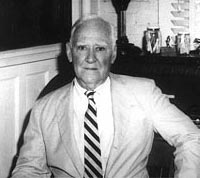
Actually, it's kind of an art that you have to have done a long time to develop.
I never did figure I was an expert or an artist or anything, but that's the way I do it. And people buy the cigars, so I don't know.
- Photo to the left, Ed Finck, Bill’s father, at his office in the cigar factory
So you're the one that switched to machines. Before we get to that, then, let's go back to you. You were born in San Antonio?
Born in San Antonio in 1930 [November 18, 1930].
And who's your mom?
My mother was Mary Fisher. Her father was in the wholesale lumber business here.
I want to remember these women. Your grandmother was…what was her name? Henry's wife?
Nellie Kennedy. She was from New Orleans.
So you grew up in San Antonio. And you grew up around the cigar company.
Right.
You don't envision yourself here for your life. Do you have other plans?
I do now—sixty years old—I got too many new plans now.
- Photo to the right, Bill, age 5, sitting on steps to right of center with other children at a company Christmas party in 1935
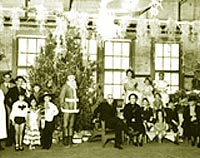
You went to Notre Dame. I read that.
Right. Went to Notre Dame, Texas University, and then I finally went to the law school at St. Mary's. Got out. My brother was going to be the cigar maker, and I was going to be…to do something. I didn't really want to be a lawyer either. I got a job as a cowboy when I got out of law school. It was my first job. Worked in the oil fields in the summer when I was in law school. And then I got me a job as a cowboy, and that's what I really wanted to do.
Where were you a cowboy?
In McMullen County—Fowlerton. I worked for Jess McNeal. He had a ranch down there.
When was it you went to Venezuela? Was that after law school?
I got out of law school. I finished working on the ranch, came up here, and worked for my daddy two or three years. Then I decided I wanted to go to South America, so me and an old boy went to South America. Bought us a car and took off driving.
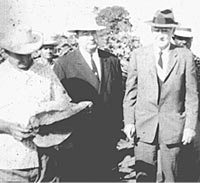
Did you know you were going to go to Venezuela when you took off driving?
No, we really didn't. We got to Costa Rica, and we knew we couldn't drive all the way through. We had to ship the car from Costa Rica. The boat we got went to Maracaibo, so that's where we went. If it had gone to Colombia, I probably never would have gone to Venezuela. I had a high school friend down there working for an oil company. We moved in with him. Got the car hung in customs, so we were just fooling around there, sharp shooting. We decided we’d start us a hog farm. So we rented a farm, bought a truck, bought a bunch of hogs, and bred hogs for about a year.
- Photo to the left, Ed Finck buying tobacco in Cuba in 1955
Did you know anything about hogs?
My partner did. He went to Oklahoma A&M.
Who was your partner?
John Farley.
Was he a San Antonio man?
Yeah, he and I went to school together. He lives on a ranch out in D'Hanis now. I met my wife down there.
Wow, changed your life totally.
Yeah. She came up here to go to school. I went on and saw all of South America and then came up here. Decided it wasn’t worthwhile for her to go back home, so might as well get married. So here we are.
How old were you when you were doing this adventure?
Twenty-six, twenty-seven.
- Photo to the right, Tobacco field, Cat Spring, Texas, 1970
Were your parents supportive of your pig farm adventure—hog farm?
They didn't have much choice. They were here, and I was there.
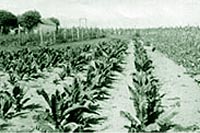
I just wondered if they had a real supportive attitude toward you seeking your fortune around the world, or if they wanted you to get on home.
Oh, no. My parents never groused at me about anything like that. My father was sure his whole life that I would come back and run the cigar factory. And I was just as sure that I never would. And look who turned out to be right!
Your brother was here, though.
My brother and my father fell out before he ever got out of college, so they determined that that was not the thing to do, to try to work together.
You came back, and you married the woman whom you had met in Venezuela.
Hilda Delepiani.
- Photo to the right, Employee operating tobacco-stripping machine
Does her family still have Venezuelan connections?
A lot of her family has moved to Texas. She has a sister that lives in Midlothian. Her brother lives in New Mexico now. He lived in Austin for a long time. She still has some sisters in Venezuela.
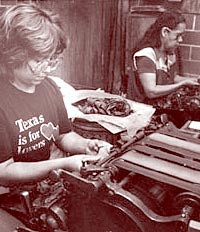
You toured all of South America. Sounds wonderful. Did you drive all through South America?
We sold the farm, closed the pig farm. My partner didn't want it. He'd had all the Spanish-speaking Latin America he wanted. We did that, so I did my tour by jitney, bus, airplane, narrow-gauge railroad train, motor launch, went on a steamboat across Lake Titicaca. Anyway you could go I went, except burro-back.
By yourself?
Yes.
For how long?
About three months. I never met anybody else who did that around South America, but it was kind of fun.
Then you came back and started working here?
I had a law office. And then the old man was starting to get forgetful; the lease expired on the old building; the Cuban thing happened; a whole bunch of different things. I thought I'd go and help out a little bit. I helped out at noontime, and then all afternoon, and then I moved my law office to the cigar factory. So, here I am.
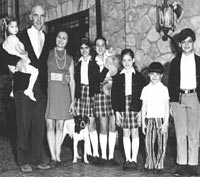
Was your father still alive when you changed to machinery?
Yeah. But his memory was gone completely, so he didn't have any sensation. When we built the building, he didn't believe in buildings; he didn't believe in owning real estate. He didn't like it too much when I built this building. I think I brought him down here and showed him where it was.
- Photo to the left, Bill Finck family, c. 1970; (left to right) Bill holding Laura, Hilda, Caroline, Kathleen, Julie, David, and Billy
Did you name the street Vera Cruz?
No. Vera Cruz was already....
You said your grandfather went to Vera Cruz. I thought maybe he….
No. Vera Cruz Street, as a matter of fact, has been part of San Antonio going back to between the time when my great-grandfather left and my grandfather came back. Vera Cruz is an old street in San Antonio.
I read that you have some old machines that they don't make any more. Is that right?
Now they don't make any cigar-making machines. They are old, and they don't make any cigar-making machines anymore.
So, if these break down…?
We make parts for them. We have a good machinist. We make our own parts. I've got a real good mechanic. We keep them renewed; they'll run forever. We just march on. But there's no new cigar-making stuff to make this kind of cigars.
What about the social…whenever it was when people started talking about smoking cigarettes being bad for your health? Did that hurt the cigar?
The surgeon general's report, which was what, '63, '65, right in there, the first surgeon general's report said that smoking cigarettes would give you lung cancer, and smoking a pipe and cigars had the same health effect as not smoking at all.
- Photo to the right, Bill Finck in the Texas Legislature, 1971
Did he say that?
Oh, yes.

Well, that’s because people say they don’t inhale. But I don’t believe that. Do you not inhale?
No. I never knew anybody [who] got lung cancer from smoking cigars. I'm not going to get out and beat the tub for any kind of health thing, but that is what the surgeon general's research proved: smoking cigarettes would give you lung cancer; smoking cigars and pipes had the same health effect as not smoking at all. The consumption of cigars skyrocketed because people wanted to be healthy and still smoke. Pretty soon they found they didn't like them as much, and they switched back to cigarettes. From there the industry went to an apex, and since then it's been on a steady decline. And now the nationwide percentage is much lower than before the surgeon general's report.
Do you belong to a national cigar-manufacturing association or anything like that?
I don't belong to the association, but I communicate with them. I'm kind of independent.

I got that impression. What about women?
I like them. They're nice. (Laughter)
- Photo to the left, Bill Finck in the Texas Legislature, 1971
No. Women and cigars. If they're so good for your health and all, there should be some way to make women want to smoke cigars.
I have never tried to make women want to smoke cigars. A lot of companies have, but I think they are all full of prunes. Smoking cigars is a man's habit. If women want to be men, fine, let them smoke cigars. I haven't got any objection to it.
Why a man’s habit, other than that men have done it?
It’s tradition. I would be overjoyed to see women want to break the tradition and walk up and down the streets smoking cigars, but I'm not going to waste my time trying to sell it. Smoking cigars is a man's habit, and it has always been kind of a sign of affluence. It's a pleasant thing to do. Maybe women don't enjoy them. I’m gonna tell you something: men and women are different. Anybody wants to make them all the same (they work on it real hard), it's all right with me.
Men more naturally like cigars. I really agree with you, although in history there have been some famous women who have smoked cigars.
I understand that in Denmark women smoke cigars. I've been told that.
If you wanted to smoke and you didn’t want to smoke cigarettes, that would be an option. So, your children, are they involved?
My son is; Billy is here. He must be twenty-eight years old. I can't believe he's that old. He's been here with me several years. Likes to make cigars. Some of my girls have worked here, off and on, but he's the only one that seems to be permanent. My other boy, David, works for the state in Austin. I've got six kids. One of my girls is a lawyer in Dallas, Caroline works for an interior decorator here in San Antonio, and Julie works for the MGM studios in Los Angeles. Laura is about to finish Texas Tech. I'm going to get the sixth one out of college.
We were talking about what cigars mean. You're really right, it is really a man's thing. What is it about cigars? What feeling does it give you when you smoke a cigar?
Well, a cigar is a very enjoyable experience. It tastes good; it's pleasant. It's also a symbol of affluence. When I was growing up, all the successful bankers, lawyers, and judges all smoked cigars. You'd see them enjoying a cigar and think, I'd like to try that.
- Photo to the right, Bill Finck runs for Bexar County Treasurer and wins
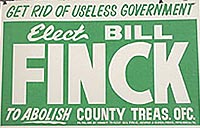
And you said that judges even smoked on the bench?
Oh, yes. Judge Quinn smoked cigars on the bench; Judge McCorry, the criminal judge, used to smoke cigars on the bench.
Once, weren't you a judge somewhere?
I was a city judge in Municipal Court, called the Corporation Court then. I was an alternate judge for about a year. They called me down there to substitute and everything. I always smoked cigars. Nobody thought a thing of it.
Do you see it on the wane now, cigar smoking? Do you see that changing?
Yeah. You can't smoke cigars anyplace. They've got an ordinance against smoking cigars, a rule that you can't smoke in the courthouse.
You know, I think there's still a sense of it being a symbol of something.
There's some symbolism about it. I can't tell you exactly what it is, but it's there.
I wanted to talk about when you decided to run for the legislature. You had worked on John Connally's campaigns.
Yeah, I worked on Connally's campaigns. He came here and complained we should have a better delegation from San Antonio in the legislature, and I thought, "I think I'd like to do that."
- Photo to the right, Scene in San Antonio drug store c 1930 (Travis Club cigars in case)
So, you just ran.
I just did.

That was in 1966?
'66, right.
And then, how long were you in the legislature?
'66 through '72. Six years.
How long a term is it?
Two-year terms.
So, you had to run two more times.
Right.
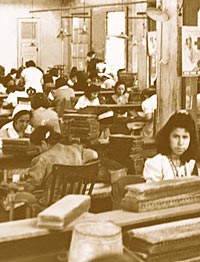
What was it like? Did you like being up there?
Oh, yeah. Most interesting thing I ever did in my life. I loved it.
Does it seem like a long time ago?
Ah, the older you get, the shorter-time-ago anything was.
- Photo to the left, Factory workers hand-rolling cigars
Was there anything significant about that time in the legislature? Did you work on anything?
I don't know. I was into the water business. I was on the Water Commission. The Appropriation Committee was my big thing, where the money gets spent. For a brief period of time, I was chairman of the Appropriations Committee, which is probably why they have the Finck display in the Institute of Texan Cultures.
That was when they were building the…
Oh, no, it was already built. They added me in after I became chairman.
But you said you knew Henderson Shuffler.
Well, I knew him from me being in the legislature and being the Bexar County member of the Appropriations Committee. And he, being Director of the Institute, he came knocking on my door.
So, he would have to come and get the Committee to pass it if they wanted any more money. Who was governor at that time?
Connally was governor. Then Preston Smith was governor. I think Connally was governor the first session I was up there, and the next two were Preston.
What's your memory of, your impression of, the legislature as far as a body of people trying to do well and do right for the State of Texas?
They were a bunch of real good guys there. Of course, there are always a few that aren't so slick. But we had a bunch of real good guys. Almost everybody was trying to do what was best for the state.
So you did feel it was a civic project and not a personal project for most people?
Right. It's an ego trip, too. Any politics [is]. Anybody tells you different is a liar. Vanity is a big inspiration for being in politics.
But once you get in there….
You just get vainer.
- Photo to the right, Factory workers at a vintage cigar-rolling station. Machines are used but considerable hand work and skill is required.
(Laughter) Did you get beat, or did you decide not to run again?
Yeah, I got beat. Once you get beat, there ain't no use in bloodying your head twice. Running is quite a chore. There is some fun to it. Getting beat is pretty tough.

Well, now, I don't know about then, but it costs so much now.
It's not supposed to be your money.
How long before you decided to be the county treasurer?
'82 I ran and got elected. They appointed me before I ran. The old treasurer resigned.
What is a county treasurer?
Something that everybody should do is stop and think what is every political job that's out there. Because people think we've got all these jobs and they're all important, that they're always there, and they vote for them. Most people don't have any idea what anyone does.
The [office of] county treasurer was part of the original Constitution of the State of Texas, a constitutional office. And it was really provided to handle and guard the money that belonged to the county, which was all money. They didn't have many banks and didn't have checks. They probably had gold bullion.
They had actual money.
The treasurer's office in all the old county courthouses and the treasurer's office in the original state capitol building all had big vaults to keep the treasure in. That's what the treasurer's office was. They don't carry much cash anymore. What the treasurer's office did when I was there was, we gathered the deposits from all the different county agencies and prepared the deposits. And then we kept books on the warrants that were written and the bank account, kept track of the bank account. The big argument was with the guy that was running the computer down there, the county computer. [I wanted him to] put all of that on the computer. "Oh, yes, we'll do it," but a whole term went by, two years, and they never got around to it. But it's all on now.
Did you run on the platform that you would?
Oh, yes. My platform was that I would make my best effort to abolish the office, and I wouldn't take any pay for doing the job.
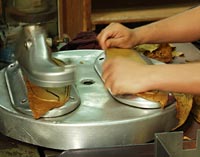
Oh, so you didn't take any pay?
Oh, that was the most famous thing I did. They all picked around at me so much about that. Someone asked me something about it, and I said, "I'll just light a cigar with the first paycheck I get." He issued the paycheck. I tried to get him not to. So, I called a press conference, stood on the back steps of the courthouse, lit me a cigar with a $2700 check. The press loved it. I was on every news story on the television, all the newspapers. I've got a big picture of me standin' there with my big cowboy hat on lightin' a cigar with the check.
- Photo to the left, Close-up of cigar rolling machine.
So what did you do with the next check? Did he quit [writing them]?
No. We had a big fight about that.
He had to write the check. What you did with it was your business.
He insisted he had to, but I kept telling him he didn't have to. So finally, what we did was, I got a bill passed in the legislature, said you don't have to take pay if you don't want it, provided the method to do it. Meanwhile, I think he’d stopped issuing, and I finally got him to issue me one for the whole amount, and I deposited it and wrote a check back as a contribution to the county. He did me a W-2 for it. I had a horrible time. I paid income tax on it. Messy as hell.
Did you get rid of the office then?
Right. I went to Austin. I know how Austin works. I got me a sponsor, and I got a resolution to a constitutional amendment introduced; got it passed; put it on the ballot—statewide ballot—to abolish the Treasurer's Office of Bexar County and assign the duties to the county clerk. And we passed it.
And the county clerk can keep these books?
Sure.
Did any of the other counties follow suit?
Yes. Quite a few of them. Certainly not the majority, but I'd say eight or ten.
Interesting. I think people might come up with ideas but don't have the energy to pursue them. It takes a lot of energy to run for an office that you are going to abolish.
It takes some doing. It was just as hard to win that as anything. I had seven opponents in the Democratic primary and one in the general election. I had to run the primary race, the run-off primary race, and the general election race.
What are your political aspirations, as we speak?
I don't really want to be anything. I wouldn’t mind abolishing something else.
Have you thought of something to abolish?
Somebody suggested the Commission of Internal Revenue Service. (Laughter)
You’ve had a really interesting history. Do you think you'll keep working here? Be like your father and your grandfather?
Oh, yes.
And you're practicing law, too?
I've got about four clients.
Is that all you want?
I wouldn't mind having another really good one. I represent industrial water utilities, of which there ain't many. It's differentiated from a governmental entity or a cooperative. I have a nice group.

